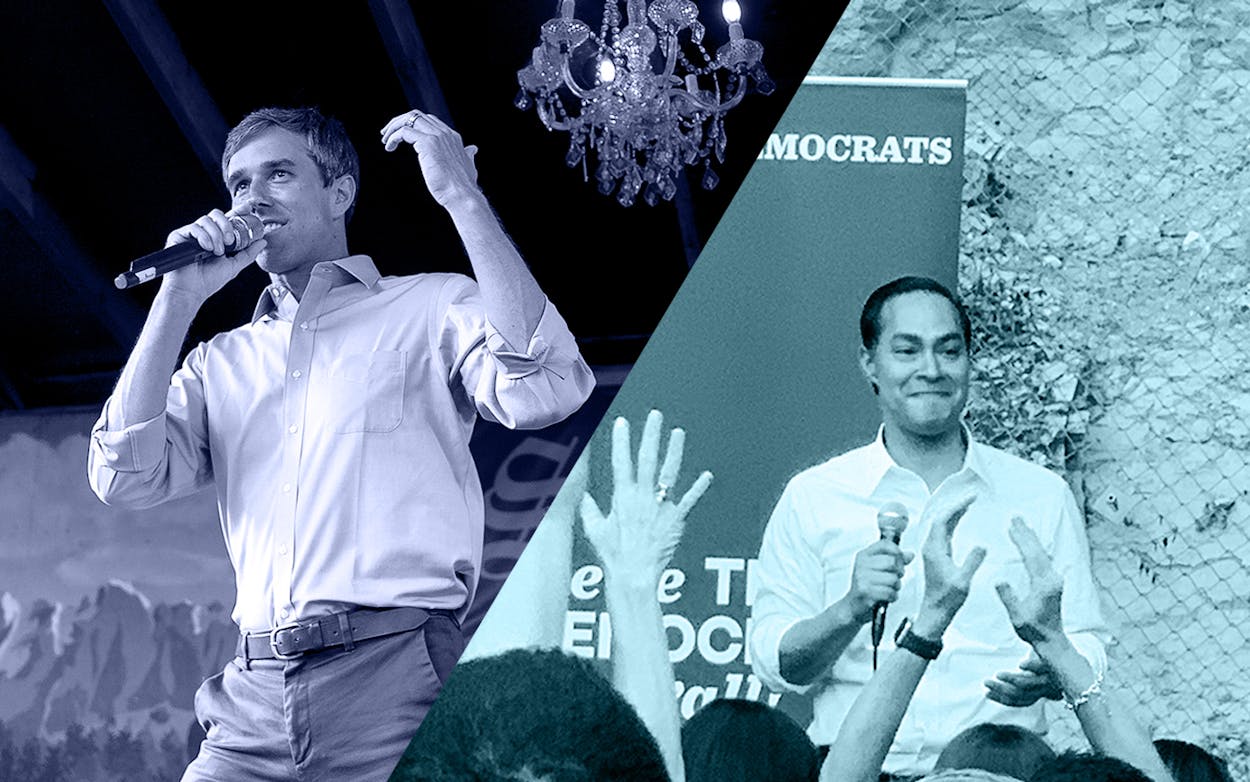Texas Democrats still love Beto O’Rourke. In polls of the state, he leads every candidate in the field except Joe Biden. His improbable 2018 Senate campaign, which earned him more votes than any Democrat in the history of Texas, still carries a lot of goodwill in his home state. Nationally, though, he seems to be struggling to gain traction. South Bend mayor Pete Buttigieg has succeeded in attracting big money from people who believe the next president of the United States should be a nice young man who likes classical literature, and O’Rourke’s performance at the first Democratic debate last Wednesday night was treated by national observers as a low point for his campaign.
Part of the reason why O’Rourke debate night went so poorly was that Julián Castro, who had been running a largely under-the-radar campaign prior to the nationally televised event, seemed to go into the debate with his sights set squarely on him. He attacked the former Senate candidate on immigration, accusing him of not doing his “homework” on section 1325 of the immigration code, a 1920s-era law that was the bedrock for family separations . By the end of the week, Castro’s arrow was pointing up, while O’Rourke’s was decidedly down.
Both candidates brought those dueling arrows to Austin to end the week. Castro had a long-scheduled meet-and-greet event at 7 pm on Friday at downtown bar Cheer Up Charlie’s, while O’Rourke announced that he’d be popping up at the site of a few of his 2018 rallies, the venerable, nearby beer hall Scholz Garten, at 6 o’clock.
Regardless of whether O’Rourke specifically intended to step on Castro’s event (he told the Texas Tribune, “I don’t know what their planning was around their event”), it seemed to have that effect. The crowd at O’Rourke’s event at Scholz—which packed the venue to its 500-person capacity and beyond, with observers also watching from the sidewalk—dwarfed the one at Castro’s, where the 400-person venue had chunks of its outdoor area roped off for press and Texas Democratic Party volunteers in order to fill the space.
O’Rourke’s performance was what people have come to expect from the candidate: His rhetoric soared, he sounded impassioned, he sweated into his shirt. He spent a lot of time talking about the detention centers at the border, and called for the crowd to join him in Clint, Texas, near his El Paso home and the site of one of the more infamous of the camps housing immigrants.
Castro, meanwhile, delivered a version of his stump speech that made clear how effective his debate night performance was—a number of the talking points he delivered at Cheer Up Charlie’s were things that he’d somehow managed to work into his answers to questions on the debate stage. He also spent a lot of time basking in the glow of a well-received debate performance. Among his first words to the crowd were, “So how’d I do?”
It was actually kind of weird—Castro spoke like a candidate who was reveling in successful campaign strategy in front of a crowd at a political event. He talked about entering the debate with low name ID, and knowing that he needed to maximize his time on that stage to make an impact. In a line that seemed to infuriate some of O’Rourke’s supporters on Twitter, he talked about how, before the debate, he’d been cast as the “other Texan” in the race. “That is no more,” he said from the stage. “I am the Texan.”
Castro’s ability to score earned media and generate impressions is certainly a relevant thing to the Castro campaign, but it’s odd that his fans are supposed to rally around that at a campaign event. It makes sense that last week’s debate night—which, according to a statement from the campaign, saw fundraising spike by more than 3000 percent—was one of the defining evenings in the life of the young former San Antonio mayor, but talking about the Equal Rights Amendment is still the bigger applause line.
Regardless, Castro is enjoying his transition from “fringe candidate” to the mid-tier of the primary field. That he’s walking over O’Rourke to get there must sting a little bit. After all, O’Rourke supporters were frustrated by Castro’s 2018 decision to sit out the statewide races. If he had, say, run for governor it might have helped O’Rourke, who lost his Senate race by fewer than 3 points. But Castro would have been unlikely to actually beat Greg Abbott (the Democratic candidate lost by more than 13 points), and losing a gubernatorial race would have made it harder for Castro as a presidential candidate. Did Castro owe his political future to the possibility of boosting the Beto 2018 campaign? It’d be hard to argue that he did, but there are also plenty of O’Rourke supporters who were let down.
All of that history helps explain some of the tension in the cold war between Castro and O’Rourke. There’s also an even more practical reason the two are waging war right now, which is the 2020 primary calendar. It’ll be seven months before the first delegates are awarded in Iowa, but after that, the primary calendar gets crowded quickly. Texas, which votes on March 3, will be awarded 228 delegates in a primary that will be a must-win if either candidate wants to actually secure the nomination. In a field this crowded, collecting a huge chunk of delegates in their home state is critical for both men.
What happened in a debate in June 2019 is probably not going to be the thing that defines O’Rourke or Castro, either (and hopefully Castro spends less time talking about what a good job he did from the stump soon), but soon enough there will likely only be room for one candidate who is known as “the Texan.”
- More About:
- Politics & Policy
- Julian Castro
- Beto O'Rourke
- Austin








